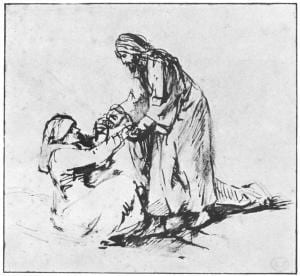
Source: Rembrandt / WikimediaCommons
At the beginning of his ministry, when Jesus was in Nazareth, he gave an indication of his messianic mission. After reading from the prophet Isaiah, Jesus told his audience that what was said by the prophet was being fulfilled in their presence:
“The Spirit of the Lord is upon me, because he has anointed me to preach good news to the poor. He has sent me to proclaim release to the captives and recovering of sight to the blind, to set at liberty those who are oppressed, to proclaim the acceptable year of the Lord.”
And he closed the book, and gave it back to the attendant, and sat down; and the eyes of all in the synagogue were fixed on him. And he began to say to them, “Today this scripture has been fulfilled in your hearing” (Lk. 4:18-21 RSV).
How was this fulfilled? It was fulfilled in Jesus, in the incarnation. The messianic mission, the Gospel, the good news, was the new good news to the poor. The poor, the mistreated, those broken down with disease or oppression, not only have Jesus as their spokesperson, but also as the one who sets them free, liberating them from the grave injustices which they received from the hands of the rich and powerful. Isaiah promised them freedom, and Jesus gave it to them in his person. Jesus, filled with the spirit, as the messiah, had come to bring justice to the world.
Social justice is at the heart of the Gospel. It is impossible to have an authentic representation of the Gospel without it. Jesus not only preached social justice, he indicated that in and through him, social justice would be brought to the world. To oppose social justice is to oppose Jesus, and to reject the good news which was fulfilled in Jesus Christ. “Religion that is pure and undefiled before God and the Father is this: to visit orphans and widows in their affliction, and to keep oneself unstained from the world” (Jas 1:27 RSV). True religion, the true faith, cannot be found apart social justice; to pit social justice against the Gospel is to ignore the Gospel itself, as it would ignore the words of Jesus who proclaimed throughout his ministry the demands of social justice:
And he lifted up his eyes on his disciples, and said:
“Blessed are you poor, for yours is the kingdom of God.
“Blessed are you that hunger now, for you shall be satisfied.
“Blessed are you that weep now, for you shall laugh.
“Blessed are you when men hate you, and when they exclude you and revile you, and cast out your name as evil, on account of the Son of man! Rejoice in that day, and leap for joy, for behold, your reward is great in heaven; for so their fathers did to the prophets.“But woe to you that are rich, for you have received your consolation.
“Woe to you that are full now, for you shall hunger.
“Woe to you that laugh now, for you shall mourn and weep.
“Woe to you, when all men speak well of you, for so their fathers did to the false prophets” (Lk. 6:20-26 RSV).
Blessed are the poor; woe to the rich. “And Jesus said to his disciples, ‘Truly, I say to you, it will be hard for a rich man to enter the kingdom of heaven’” (Matt. 19:23 RSV). Blessed those who are hungry; woe to those who are full – satisfied in gluttony at the expense of the poor and needy. Blessed are those who weep due to injustice: woe to those who laugh and ridicule at those suffering from need. The heart of the Gospel is the dictate of love, and love will seek for justice for the beloved.
Our salvation is given to us as we are freed from all sin. Before our salvation, we are poor and needy, having suffered under the oppression of death. Jesus, the good savior, works to reorganize the world, to restructure it, ending the dominion of sin. However, that reorganization requires us to work with him and in him, to be baptized into Christ, to put on Christ, and fight injustice wherever it is found. Injustice is rooted in sin: to be indifferent to injustice is to be indifferent to sin; to join in with injustice is to join in with sin and be among those who were warned by Jesus as to the woe they face if they remain attached to sin: woe to those who accept injustice, because God’s justice is coming, and is already here, transforming the world.
Just as faith without works is dead (cf. Jas 2:14-20), so the Gospel without social justice is dead, indeed it is a false Gospel which must be rejected. Jesus preached social justice. He said that our eschatological fate will be tied with how we treat others in relation to justice (cf. Matt. 25: 31 -46). If we are with Christ, we promote social justice and act upon it. Indeed, as John said, this is how we know we are with Christ:
But if any one has the world’s goods and sees his brother in need, yet closes his heart against him, how does God’s love abide in him? Little children, let us not love in word or speech but in deed and in truth. By this we shall know that we are of the truth, and reassure our hearts before him (1Jn. 3:17-19 RSV).
Truth is one with deed: without it, it is not yet truth. Faith without works is not faith, because faith without love is not faith in the God who is love. The Gospel is the good news that God has become man in order to destroy the works of unlove, the works of injustice, that is the works of the devil. “He who commits sin is of the devil; for the devil has sinned from the beginning. The reason the Son of God appeared was to destroy the works of the devil” (1Jn 3:8 RSV).
Those who would warn Christians against social justice, fearing that a focus on social justice detracts from the Gospel, fail to see the unity of the Gospel with social justice itself. It is like those who say talk about works detracts from the Gospel. It can only come from an unbalanced position which not only ignores much of what Jesus said during his earthly ministry, it would risk condemning him because of the focus he put on social justice throughout his preaching. In the Apocalypse, Jesus warned against this attitude, of those who thought their prosperity proved their faith:
And to the angel of the church in Laodicea write: “The words of the Amen, the faithful and true witness, the beginning of God’s creation. `I know your works: you are neither cold nor hot. Would that you were cold or hot! So, because you are lukewarm, and neither cold nor hot, I will spew you out of my mouth. For you say, I am rich, I have prospered, and I need nothing; not knowing that you are wretched, pitiable, poor, blind, and naked’” (Rev. 3:14 – 17 RSV ).
If we have faith, we will be faithful to the dictates of Christ. We will preach the fullness of his preaching. Not only will we preach as he did, offering liberty to the oppressed, we will work with Christ to establish such liberty, such justice in the world. Instead of thinking we are fine for having some right beliefs, we will act on such beliefs, and have right livelihood as well:
Let us hold fast the confession of our hope without wavering, for he who promised is faithful; and let us consider how to stir up one another to love and good works, not neglecting to meet together, as is the habit of some, but encouraging one another, and all the more as you see the Day drawing near (Heb. 10:23-25 RSV).
We must encourage each other to follow the dictates of love and the justice it wants to establish, so that God’s will can be done on earth as it is in heaven. We are called to work for this. The good news is the good news that all of sin is being undone and the power and dominion of sin, of injustice, is being rooted out and destroyed. Social justice is at the heart of the Gospel, and so let us, as Isaiah indicated, “learn to do good; seek justice, correct oppression; defend the fatherless, plead for the widow” (Is.1:17 RSV), thereby showing we truly live out the Gospel and are children of the Most High.
Stay in touch! Like A Little Bit of Nothing on Facebook













